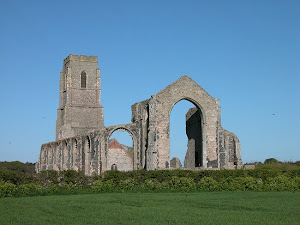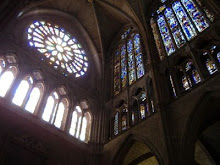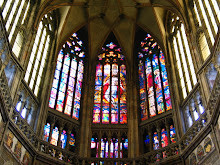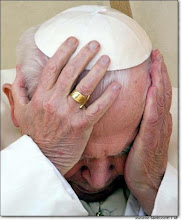The Name of Francis, the Rule of St. Ignatius, and the Example of Jonah
The new pope tells how and why he chose to go by the name of the saint of Assisi. But already he has recalled the founder of the Society of Jesus as well. And like the prophet, he wants to preach to the modern Nineveh the forgiveness of God. A revealing interviewby Sandro Magister

ROME, March 16, 2013 – For the six thousand journalists packed into the audience hall this morning, Jorge Mario Bergoglio had news.
He recounted how and why it came into his mind to select as pope the name of Francis, precisely as in the conclave the votes were falling to him:
"At the election, I had beside me the archbishop emeritus of São Paulo and also prefect emeritus of the congregation for the clergy, Cardinal Claudio Hummes: a great friend, a great friend! When the thing was becoming a bit dangerous, he comforted me. And when the votes rose to two thirds, the usual applause came, because the pope had been elected. And he embraced me, he kissed me and said: 'Do not forget the poor!' And that word entered here: the poor, the poor. Then I thought of the wars, while the scrutiny continued, until the last of the votes. And in this way the name came, in my heart: Francis of Assisi. He is for me the man of poverty, the man of peace, the man who loves and cares for creation; at this time we as well have with creation a relationship that is not so good, no? He is the man who gives us the spirit of peace, the poor man... Ah, how I would like a Church that is poor and for the poor!”
And he concluded:
"Afterward, some [cardinals] made various remarks. ' But you should have called yourself Adrian, because Adrian VI was the reformer, there must be reform. . . .' And another told me: 'No, no: your name should be Clement.' But why? 'Clement XV: this is how you avenge yourself against Clement XIV, who suppressed the Society of Jesus!'"
By the irony of fate, Clement XIV, the pope who in the eighteenth century closed the order of the Jesuits to which Bergoglio belongs, was a Franciscan.
*
Pope Francis, in his first days as pope, has not however neglected to recall also the founder of his order, St. Ignatius of Loyola.
On March 15, at the Mass that he celebrated early in the morning in the chapel of Domus Sanctae Martae together with a few cardinals, he improvised a brief homily.
In it he cited St. Ignatius where in the rules of discernment he advises that “in the time of desolation changes should never be made, but one should remain firm and constant in the resolutions and decisions that one made in the time of consolation.”
Otherwise - he added - if one gives in and withdraws, when the Lord again makes himself visible “one risks being found no more.”
Shortly before, during the Mass, there had been a reading from the book of Wisdom in which the wicked want to put to the test the just man “with violence and torment, to know his meekness and try his patience.” But they “do not know the mysterious secrets of God, nor do they believe in a reward for a life irreproachable.”
On the demand contained in this last word, “irreproachable,” the pope insisted strongly.
This brief homily has not been made public. But it was reported by Cristiana Caricato on ilsussidiario.net, employing the confidence of a cardinal who had celebrated Mass with the pope.
*
But in addition to Francis of Assisi and St. Ignatius, in the “heaven” of Jorge Maria Bergoglio there also shines the prophet Jonah.
In a 2007 interview with the international magazine “30 Days,” highly revealing on how he sees his mission as pastor of the Church, the then-archbishop of Buenos Aires suddenly asked the interviewer, Stefania Falasca:
"Do you know the biblical episode of the prophet Jonah?".
"I don’t remember it. Tell us", the interviewer replied.
And Bergoglio:
"Jonah had everything clear. He had clear ideas about God, very clear ideas about good and evil. On what God does and on what He wants, on who was faithful to the Covenant and who instead was outside the Covenant. He had the recipe for being a good prophet. God broke into his life like a torrent. He sent him to Nineveh. Nineveh was the symbol of all the separated, the lost, of all the peripheries of humanity. Of all those who are outside, forlorn. Jonah saw that the task set on him was only to tell all those people that the arms of God were still open, that the patience of God was there and waiting, to heal them with His forgiveness and nourish them with His tenderness. Only for that had God sent him. He sent him to Nineveh, but he instead ran off in the opposite direction, toward Tarshish".
"Running away from a difficult mission…" said the interviewer.
"No. What he was fleeing was not so much Nineveh as the boundless love of God for those people. It was that that didn’t come into his plans. God had come once… 'and I’ll see to the rest': that’s what Jonah told himself. He wanted to do things his way, he wanted to steer it all. His stubbornness shut him in his own structures of evaluation, in his pre-ordained methods, in his righteous opinions. He had fenced his soul off with the barbed wire of those certainties that instead of giving freedom with God and opening horizons of greater service to others had finished by deafening his heart. How the isolated conscience hardens the heart! Jonah no longer knew that God leads His people with the heart of a Father".
"A great many of us can identify with Jonah", the interviewer remarked.
Bergoglio: "Our certainties can become a wall, a jail that imprisons the Holy Spirit. Those who isolate their conscience from the path of the people of God don’t know the joy of the Holy Spirit that sustains hope. That is the risk run by the isolated conscience. Of those who from the closed world of their Tarshish complain about everything or, feeling their identity threatened, launch themselves into battles only in the end to be still more self-concerned and self-referential".
"What should one do?"
Bergoglio: "Look at our people not for what they should be but for what they are and see what is necessary. Without preconceptions and recipes but with generous openness. For the wounds and the frailty God have spoken. Allowing the Lord to speak… In a world that we can’t manage to interest with the words we say, only His presence that loves us, saves us, can be of interest. Apostolic fervor renews itself in order to testify to Him who has loved us from the beginning".
Last question: "For you, then, what is the worst thing that can happen in the Church?"
Bergoglio: "It is what De Lubac calls 'spiritual worldliness'. It is the greatest danger for the Church, for us, who are in the Church. 'It is worse', says De Lubac, 'more disastrous than the infamous leprosy that disfigured the dearly beloved Bride at the time of the libertine popes'. Spiritual worldliness is putting oneself at the center. It is what Jesus saw going on among the Pharisees: 'You who glorify yourselves. Who give glory to yourselves, the ones to the others'".
*
The word “worldliness” was used several times, as a danger also for “priests, bishops, cardinals, popes,” in the first homily delivered by Bergoglio after his election as pope, in the Sistine Chapel:
> "When we walk without the cross…"
But in the interview cited above there is also another passage in which the then-archbishop of Buenos Aires delineated the mission of the Church and denounced its “gnostic and self-referential” threats.
To the question about what Bergoglio would have said to the pope and the cardinals at the consistory of November 24, 2007, in which he was unable to participate, the interviewee continued as follows:
A: I would have spoken about two things of which there is need in this moment, there is more need: mercy and apostolic courage.
Q: What do they mean to you?
A: To me apostolic courage is disseminating. Disseminating the Word. Giving it to that man and to that woman for whom it was bestowed. Giving them the beauty of the Gospel, the amazement of the encounter with Jesus… and leaving it to the Holy Spirit to do the rest. It is the Lord, says the Gospel, who makes the seed sprout and bear fruit.
Q: In short, it is the Holy Spirit who performs the mission.
A: The early theologians said: the soul is a kind of sailing boat, the Holy Spirit is the wind that blows in the sail, to send it on its way, the impulses and the force of the wind are the gifts of the Spirit. Without His drive, without His grace, we don’t move forward. The Holy Spirit lets us enter the mystery of God and saves us from the danger of a gnostic Church and from the danger of a self-referential Church, leading us to mission.
Q: That means also overthrowing all your functionalist solutions, your consolidated plans and pastoral systems…
A: I didn’t say that pastoral systems are useless. On the contrary. In itself everything that leads by the paths of God is good. I have told my priests: 'Do everything you should, you know your duties as ministers, take your responsibilities and then leave the door open.' Our sociologists of religion tell us that the influence of a parish has a radius of six hundred meters. In Buenos Aires there are about two thousand meters between one parish and the next. So I then told the priests: 'If you can, rent a garage and, if you find some willing layman, let him go there! Let him be with those people a bit, do a little catechesis and even give communion if they ask him.' A parish priest said to me: 'But Father, if we do this the people then won’t come to Church.' 'But why?' I asked him: 'Do they come to Mass now?' 'No,' he answered. And so! Coming out of oneself is also coming out from the fenced garden of one’s own convictions, considered irremovable, if they risk becoming an obstacle, if they close the horizon that is also of God.
Q: This is valid also for lay people…
A: Their clericalization is a problem. The priests clericalize the laity and the laity beg us to be clericalized… It really is sinful abetment. And to think that baptism alone could suffice. I’m thinking of those Christian communities in Japan that remained without priests for more than two hundred years. When the missionaries returned they found them all baptized, all validly married for the Church and all their dead had had a Catholic funeral. The faith had remained intact through the gifts of grace that had gladdened the life of a laity who had received only baptism and had also lived their apostolic mission by virtue of baptism alone. One must not be afraid of depending only on His tenderness.












No comments:
Post a Comment